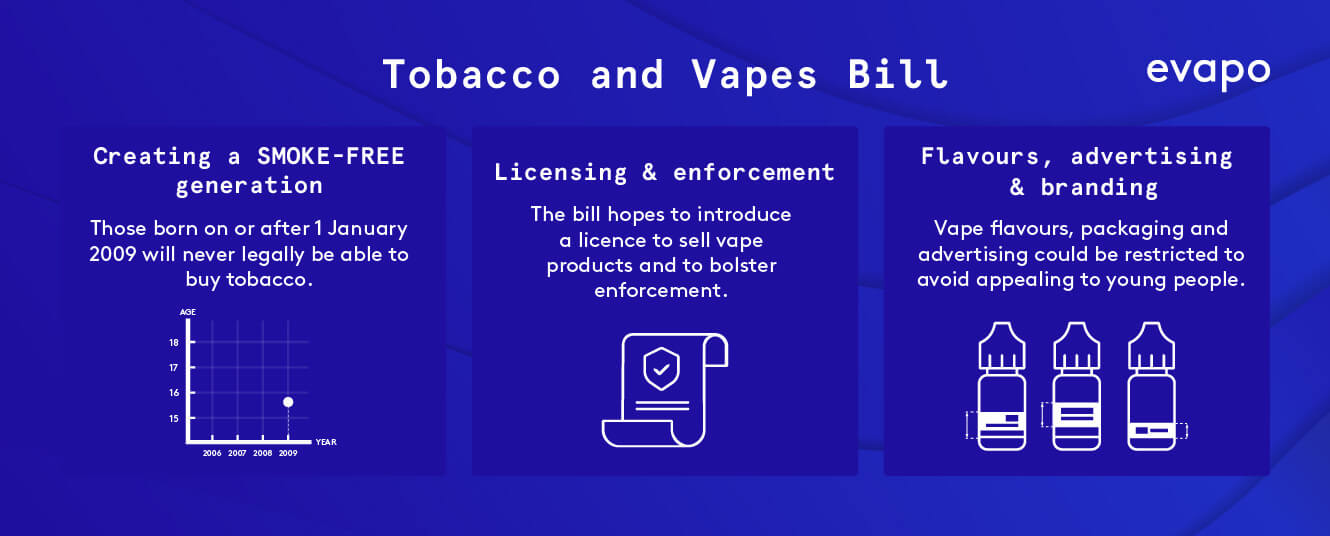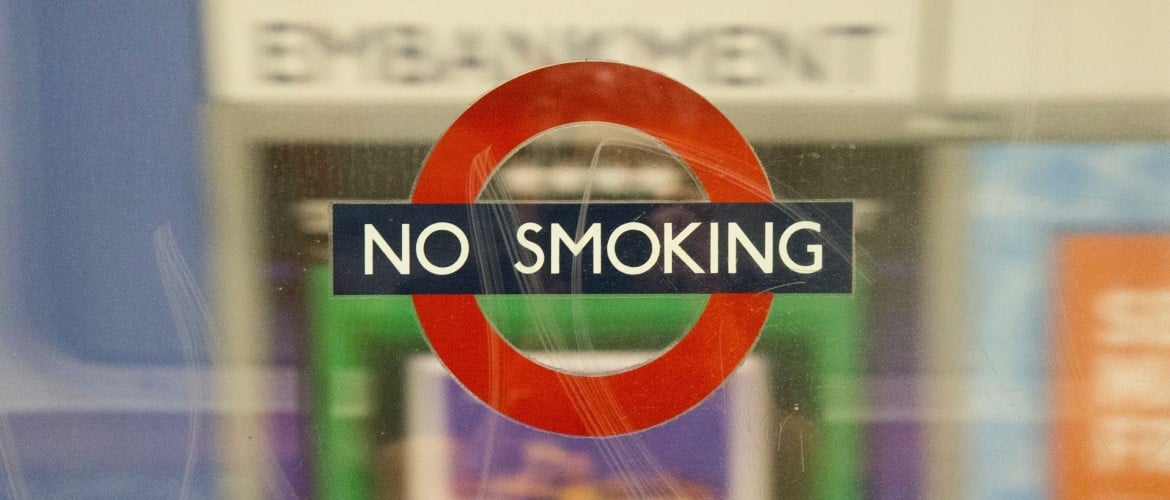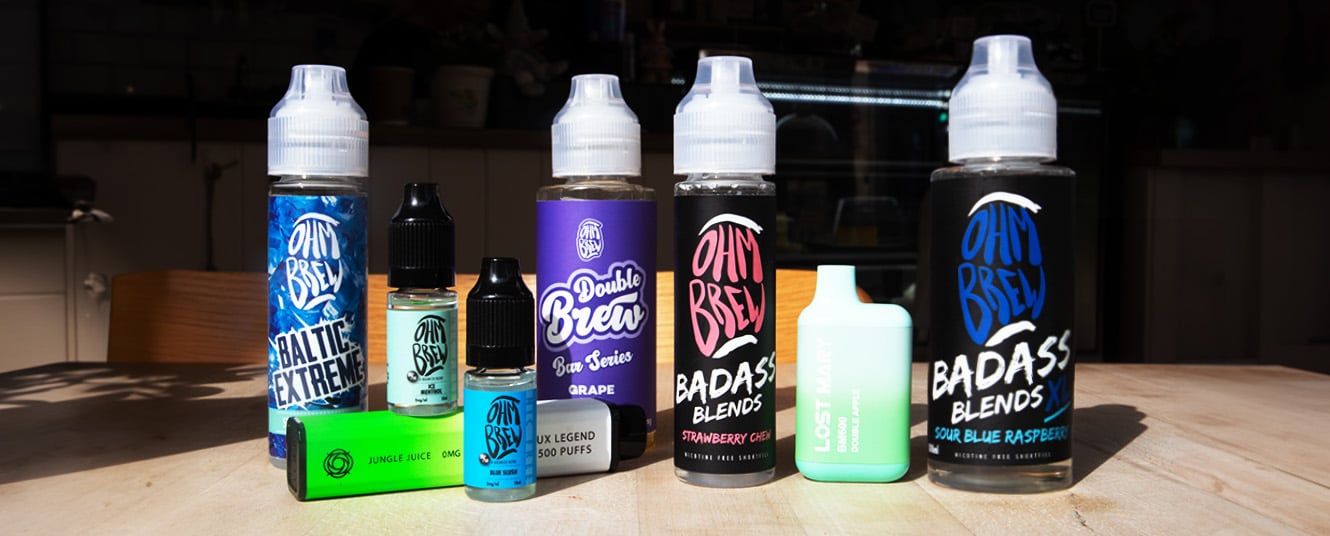The Tobacco and Vapes Bill entered the committee stage on 7th January 2025, allowing retailers, organisations, and others within the industry to submit evidence to the Bill Committee.
This gives us the opportunity to share our experiences and opinions about the proposed regulations within the bill, and suggest ways that they can be amended to ensure an outcome which will both protect young people and also ensure adult smokers and vapers are not negatively affected by future regulatory changes.
Evapo have taken this opportunity to submit our evidence and address concerns we have, in the hopes of helping to shape the bills final form.

What happens at committee stage?
The committee stage is when a line by line examination of the bill first takes place. Experts and interest parties are able to submit evidence to the committee for consideration while the bill is being examined.
It is at this stage that amendments to the bill can be discussed and voted upon, and every clause within the bill will be agreed to, changed, or removed.
Once the committee stage has been completed the amended bill will be reprinted and will return to the House of Commons for the report stage.
Our submission to the Bill Committee
While there are many aspects of the Tobacco and Vapes Bill that we agree with and fully support, like the need to prevent young people from being able to access vaping products and the introduction of a vape licensing scheme, others have caused concern over the implications they could have for adult smokers and vapers.
Three million smokers in the UK have already successfully quit smoking with the use of an e-cigarette, and vaping is not only recognised as the most popular smoking cessation tool but also the most effective. It is a crucial tool, not only for helping individual smokers to quit, but also to help alleviate the heavy burden that smoking poses for our already struggling NHS.
Our concern, shared by many in the industry, is that some of the regulations currently proposed in the Tobacco and Vapes Bill may hold negative consequences for current adult smokers and vapers, making smokers less likely to consider vaping as a viable smoking cessation option, and driving current vapers back to smoking traditional cigarettes.
With that in mind, we submitted the following suggestions for how the Bill could be improved to better ensure that the needs of adult users is equally considered, and that young people are best protected.
Limit flavour restrictions
One of the most controversial proposals within the Tobacco and Vapes Bill is e-liquid flavour restrictions.
The reasoning behind the suggestion to restrict some flavours is that some flavours, such as sweet or candy flavours, can be seen as enticing to young people. However, the intention behind the wide range of flavours available for e-liquids is to ensure it is an appealing and enjoyable option for adult users, not to target children.
Our research has found that vapers overwhelmingly prefer non-traditional flavoured e-liquids over tobacco and menthol flavours, with only 7.7% using tobaccos, 9.6% using menthols, and the remaining 82.6% opting for fruit, dessert, and beverage flavoured e-liquids.
We also found that nearly two-thirds of vapers would return to smoking if the flavours they prefer were no longer available, which could have devastating consequences for smoking rates in the UK and public health. This is also evidenced by other countries which have introduced flavour bans, where smoking rates have seen a swift increase as a result of the ban.
We suggest that flavour restrictions be remove from the Bill. There are many other regulations within the bill which will work to ensure that young people are not able to access vaping products, and this particular restriction would likely only have a negative impact. You can read more about this in our blog post ‘Is there a vape flavour ban in the UK?’
Overturn the ban on online advertising
Online advertising is already heavily restricted, and these restrictions are necessary to prevent young people being influenced towards vaping. However, the regulations suggested in the current version of the bill could actually make it more difficult for adult smokers to access information on less harmful alternatives to smoking. As vaping is such a crucial smoking cessation tool, we need to ensure that correct information, data, statistics, and research is easily accessible to help those choosing vaping to make an informed decision.
These restrictions could not only hinder the growth of responsible specialist vaping retailers, but also prevent vaping retailers from using their commercial websites to inform their customers. This information is typically only being seen by those who have visited the website specifically looking for this information, and these websites can also be age-gated to prevent underage purchases.
The new product registration scheme
There is rightly an in depth process that needs to be undertaken before a new vaping product can be registered, to ensure safety and a good control of products. However, we believe that clinical studies should not be a part of the registration process.
These clinical studies are not only time consuming but prohibitively expensive, causing what can be seen as a ban through the back door, by preventing products from achieving registration simply because the manufacturer cannot afford the cost of clinical studies, not only hindering innovation within the industry but also hindering adult smokers in trying to quit.
The vape licensing scheme
We have been advocating for a vape licensing scheme for a number of years now, and were pleased to see that this is something which has been included in the Tobacco and Vapes Bill. However, it is important that the fees for this licensing scheme are manageable for retailers to ensure the scheme is effective.
We suggest a fee of £750 per store per year, making it manageable for retailers of all sizes to be a part of the scheme and incentivising participation. At this cost licenses to 55,000 convenience and vaping stores could raise upwards of £50 million to fund Trading Standards as they enforce the new laws outlined in the bill.
By ensuring strong participation in the scheme we can not only fund enforcement services to target rogue retailers for selling illicit products or supplying to underage people, but ensure that licensed retailers across the UK are subject to regular inspection to ensure full compliance with any regulations that are brought in. We take a closer look at how the scheme may work in our post 'Will there be a vape licensing scheme?'
Higher fines for lawbreakers
In line with this, the fines for retailers who do break the law need to be high enough to act as a strong deterrent. We do not feel that £200 fines are sufficient to prevent criminals from selling illegal vaping products or selling to minors, but rather fines of £2,000 would act as a stronger deterrent.
These fines should aim to ‘hit them where it hurts’ and make them think twice about committing a criminal offence again in future, and the best approach is to raise the potential cost of criminality.
Age verification
Age verification is arguably the most crucial tool in our arsenal again underage sales, and the introduction of the licensing scheme is the perfect opportunity to ensure that retailers involved in the scheme are operating with robust age verification measures.
The funds raised by the licensing scheme should be put towards twice yearly independent mystery shops, to ensure that retailers are abiding with age verification and utilising it effectively.
Vending machines in age-gated healthcare premises
While we agree that vending machines with vaping products should not be allowed to operate in placed where age verification cannot be ensured, we believe that hospitals and mental health trusts where the age of patients is known to be over 18 should be excluded from this ban.
Many patients rely on vaping as a tool during their recovery, whether their treatment is due to smoking related illness or not. Removing the access to these specialty products risks making their recovery harder, longer, and more expensive to the NHS.
Exceptions for display regulations
We agree that there needs to be regulations in place which dictate how vape products can be displayed in stores where young people may be present, ensuring they are not displayed next to toys and sweets, or in a manner which may make them more appealing to children.
However, specialty vape stores are an age-gated premises and should be allowed to display products throughout their stores, allowing customers to view the products before making a decision about which one to use on their stop smoking journey.
Specialist tobacco retailers are exempt from this requirement, and there is no reason the same should not be true for specialist vaping retailers. We take a closer look at this aspect of the bill in our post 'Are the Government going to restrict vape displays?'
Transition time ahead of new regulations
We believe that the transition time provided to companies to prepare to implement the necessary changes once the regulations from the bill are brought in should be extended to 18 months.
This would allow businesses to continue providing the right products to their customers and ensure these products remain accessible to adult vapers, better supporting them and preventing relapse.
Updates from the Bill Committee
Evapo were the only specialist vaping retailer to submit evidence to the committee, and we are pleased to hear reports that our suggestions for the introduction of a vape licensing scheme, including a manageable annual license fee and higher fines for law breakers, are being seriously considered by the committee.
MPs have reportedly acknowledged the 'potential to prevent repeat violations' that a more substantial on the spot fine would pose to rogue retailers, and that an annual fee of £750 would not only incentivise good participation but, combined with higher fines, would make it more cost effective to follow the law.
Evapo is in full support of the Government’s aim to protect young people from nicotine use and crack down on the illicit vaping market. However, we are also dedicated to ensuring that adult smokers and vapers have access to the products they need to remain smoke-free.
In the interest of addressing both of these goals, we hope the Bill Committee will take our submission into consideration as they consult on the finer details of the Tobacco and Vapes Bill, to help ensure a balanced outcome for all.
Sources
publications.parliament.uk 05/11/2024
publications.parliament.uk 06/01/2025
























